stock struggle
Opinion Hans de Jong
Today 09:00 – Han Dae-jung
The European Commission is more bleak about Dutch inflation. Economists are more pessimistic about the German economy. The probability of a recession in the United States is increasing sharply, while China is shrinking and Russia’s trade surplus is growing sharply. I really try to discover as many positive aspects as possible in all kinds of developments. I do this because my experience shows that the economy is resilient and that most things will somehow end on their feet. But now I find it difficult to find a positive angle.
Purchasing power continues to erode. The European Commission has revised our country’s average inflation estimates for the current year from 7.4% in April to 9.4% now. This is a major adjustment over such a short period of time. This adjustment also says something about the outlook for the second half of the year. We now have inflation numbers through June. The average is 9.6%. So if we were to get to 9.4% for the year, the average in the second half of the year would be 9.2%.
Therefore, the Committee does not expect a significant decrease in inflation in the near future. That will change next year, because at the end of 2023, according to the Commission, inflation will be only 2.3%. This is possible if energy prices fall. Oil has become cheaper lately. Having become wise through trial and error, I still say: ‘We know that from the commission, in a year and a half everything will be better. The problem is that those good times are being pushed more and more into the future.’
Deflation period is coming
Although consumers are still dependent on the reserves built up during the pandemic, a blow to consumer spending is inevitable. Add to this the fact that interest rates have risen sharply and the government budget should not be expected to stimulate the economy. It is very likely that the Dutch economy, along with other European economies, will face a period of deflation. This week, the German ZEW published the results of a monthly survey of economists and analysts on the economic situation and outlook in Germany. The expectation component declined sharply after the outbreak of the war, but improved again in May and June. This was followed by another drop in July. This sub-index has reached a lower level than it was in March 2020. The assessment of the current situation has also deteriorated.

The chance of a recession in the United States has sharply increased
For the United States, I’ve been more optimistic for a long time. This economy is of course less affected by the war in Ukraine and is energy self-sufficient. As a result, higher energy prices are not leading to national impoverishment, as households have built up large savings that can now be counted on to support consumer spending. Unfortunately, the latest US numbers are not very optimistic. First, the yield curve is now really inverted. This means that the effective yield on a two-year government bond is now about 20 basis points higher than that of a 10-year government bond. We’ll see if this continues or not. But in the past, this interest rate differential has proven to be a good indicator of recessions.
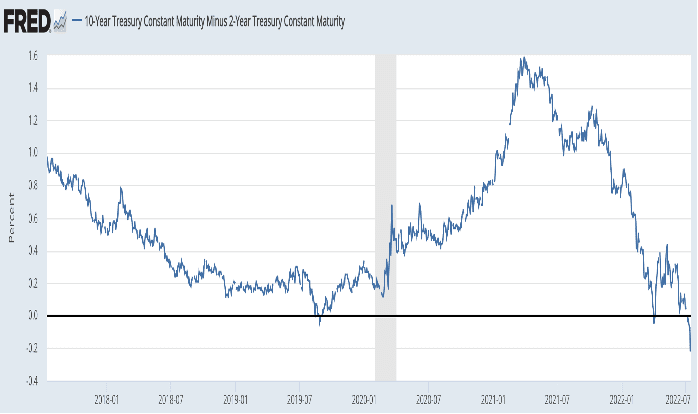
Consumer confidence had already fallen sharply. Now the confidence of entrepreneurs in small and medium-sized enterprises has fallen sharply. The National Federation of Independent Business (NFIB) confidence index fell from 93.1 in May to 89.5 in June.
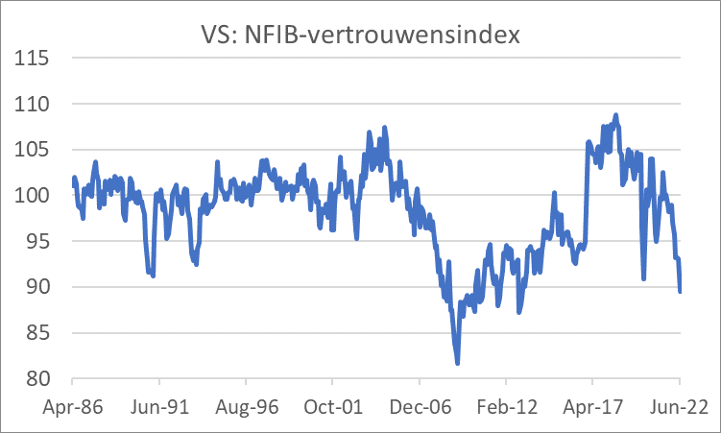
I find the NFIB indicator interesting and in the following image I am showing how much the indicator has changed compared to the previous year. The decline in the past 12 months is the largest in the past 35 years. This poll is 48 years old. Never before has the percentage of respondents expecting a better economy in the next 12 months been as low as it is now.
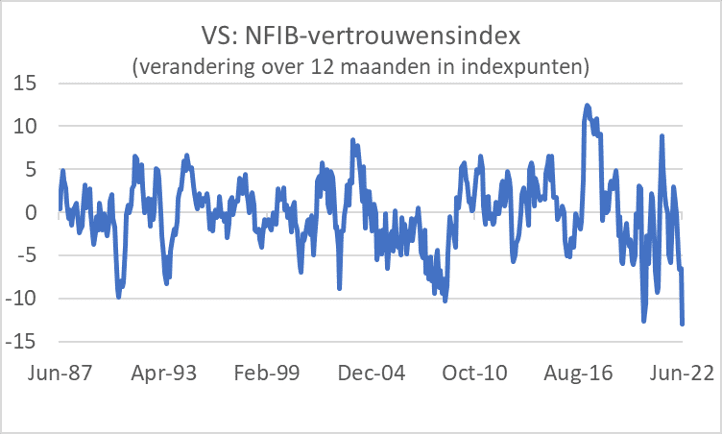
The US labor market is very tight, but it is currently deteriorating. Although there are almost two vacancies for every unemployed person, according to the so-called JOLTS report, the number of applications for unemployment benefits is currently increasing at a rapid pace. In the week of July 9, 244,000 new applications were registered, the highest number since November last year.
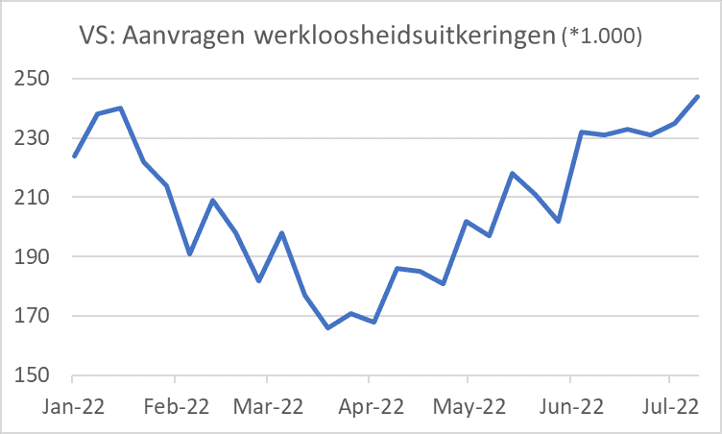
Inflation in the United States continues to rise
Inflation in the US also continues to rise: 9.1% in June versus 8.6% in May. Core inflation declined slightly, but at 5.9% (from 6.0% in May) it remained well above the Fed’s target of 2%.
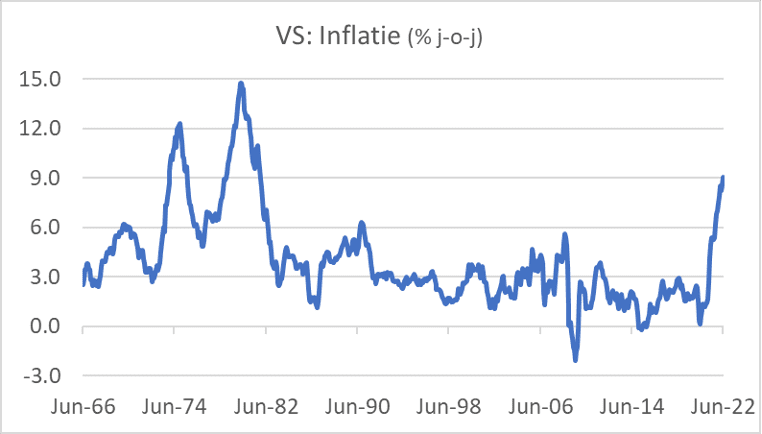
Inflation in the United States also continues to widen. Since outliers can strongly influence the average, the Cleveland Federal Reserve calculates a so-called “16% CPI.” This chain does not take into account the strongest price increases of 8% and the lowest of 8%. Inflation calculated this way is now 7%.
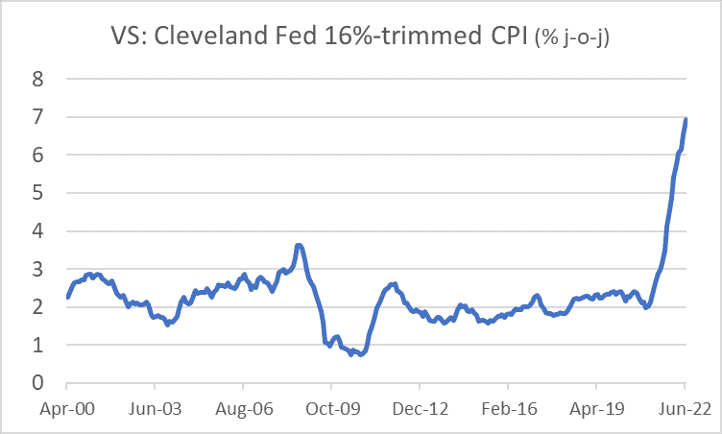
Due to lack of employment, wage growth also continues to accelerate, as can be seen in the following picture. The wage increase also fuels the inflation process.
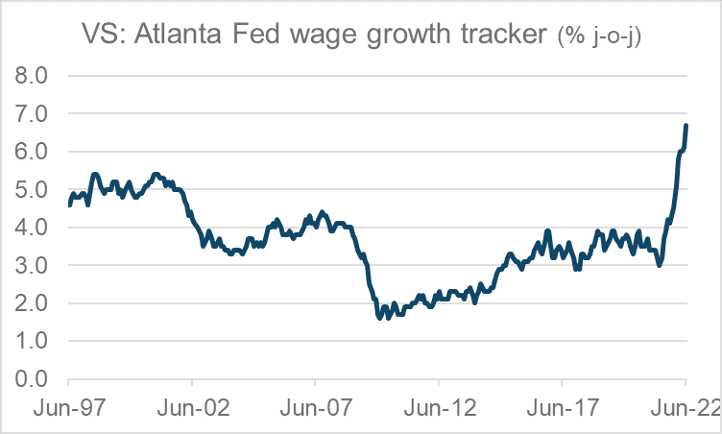
To be sure, the Fed (should) raise interest rates a little more. However, inflation in the US is unlikely to fall sharply any time soon. I have regularly pointed out the importance of rents in the form of inflation. Actual rents and rents attributed to homeowners combined make up about 33% of the inflation basket. In the United States, rents are slowly tracking house price developments. Although higher interest rates are leading to some lull in the housing market, the rise in rents will accelerate rather than decline in the coming months. The rent increase is now approaching 6%. If the total rate of inflation has to go up to 2% and rents have to go up by 6%, all other prices together must not go up at all. Well, it doesn’t seem like that at the moment.
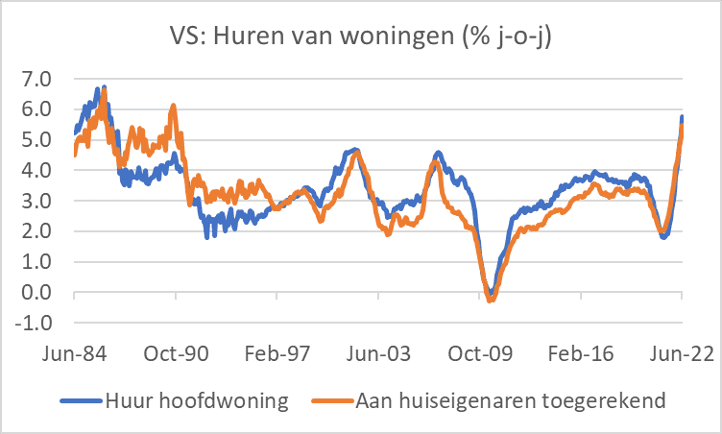
China is shrinking
The Chinese economy contracted 2.6% in the second quarter compared to the first. This was the worst number since the first quarter of 2020. On an annual basis, China’s GDP was only 0.4% higher than the second quarter of last year, after 4.6% in the first quarter.
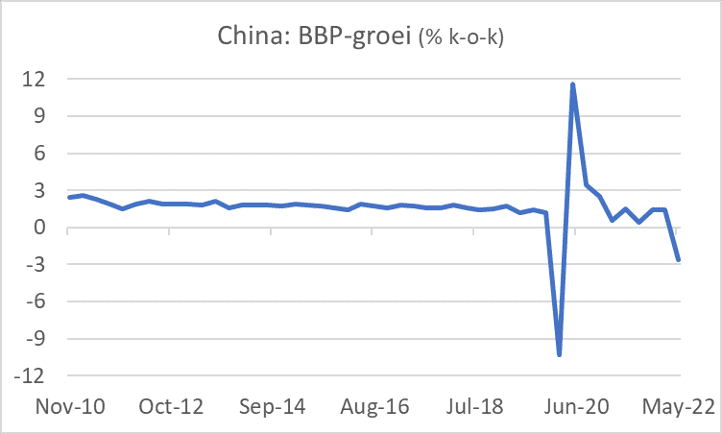
Of course, this disappointing development was mainly caused by the lockdown measures. Other numbers show that the period from March to May was particularly weak. Some of the closures were lifted in June. For example, industrial production growth rebounded somewhat in June: 3.9% yoy versus 0.7% in May. Retail sales exceeded expectations for June. Sales rose 3.1% year over year, after hitting -11.1% and -6.7% in April and May.
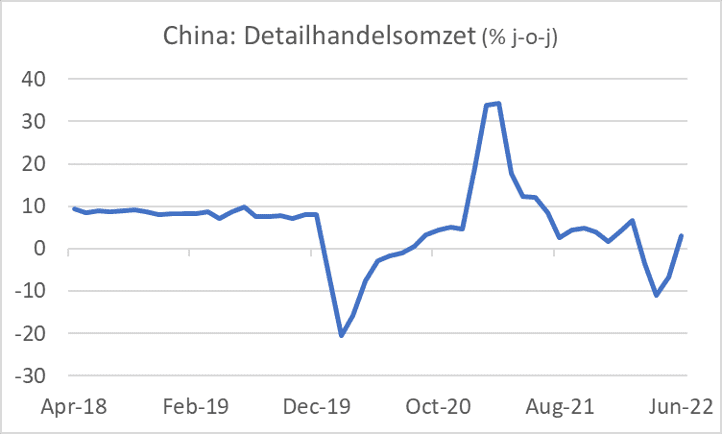
Because of the poorly effective Chinese vaccine against Covid-19 and the Chinese government’s zero-tolerance policy in the event of an outbreak of infection, China threatens to become a ‘stopped’ economy. Too annoying for the rest of the world. Chinese exports rebounded again in June, +17.9% y/y, but the value of imports was only 1.0% higher. In view of the price development, this means a large volume “minus”.
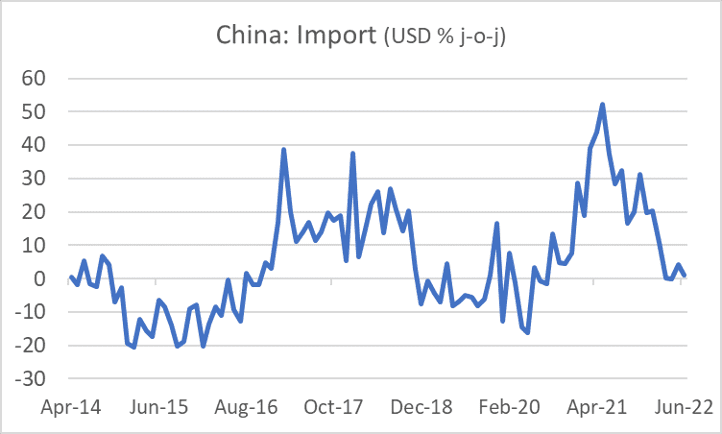
Let’s talk about Russia
Sanctions against Russia have not put an end to the war yet. They have measurable economic consequences. Over time, stopping exports to Russia will become a problem for that country as it remains deprived of essential parts of machinery, vehicles and facilities. Paradoxically, this export ban, along with rising energy prices, positively affects Russia’s current account balance of payments, as the following picture shows.
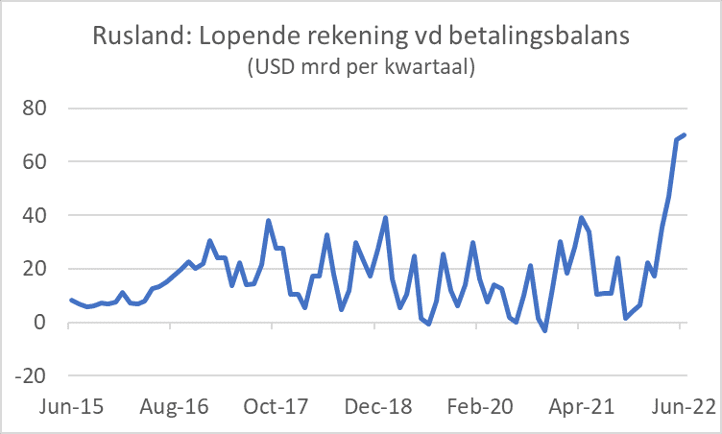
We have also tried to render Russia’s foreign exchange reserves useless. This can never completely work. The numbers show that Russia has been draining its foreign exchange reserves lately. But this is still nothing compared to previous periods.
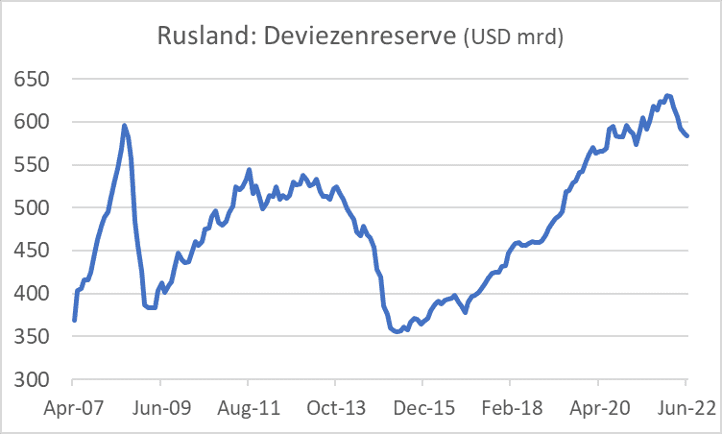
Close
This week’s macro data can be summarized briefly. The global economy is not doing well. In our country, inflation is still higher than expected and it seems to me that a period of economic downturn is inevitable. The risk of a recession in the United States is also growing. Unfortunately, China is in danger of becoming a “stall economy” due to the potential regular return of lockdowns. This is also not conducive to our favorable economic development. Finally, the sanctions that we have imposed on Russia do not in any way have a negative impact on Russia’s external position.

Han Dae-jung
Han De Jong is a former chief economist at ABN Amro and now a resident economist at BNR Nieuwsradio, among others. His comments can also be found at Crystalcleareconomics.nl
© DCA MultiMedia. This market information is copyrighted. The Content may not be reproduced, distributed, distributed or made available to third parties for a fee, in any way, without the express written permission of DCA MultiMedia.

“Total coffee specialist. Hardcore reader. Incurable music scholar. Web guru. Freelance troublemaker. Problem solver. Travel trailblazer.”






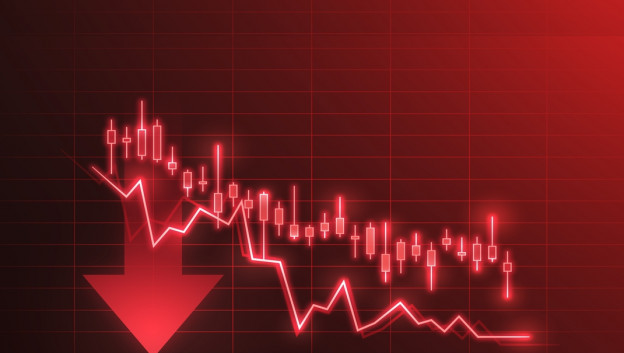
More Stories
Bitcoin price rises after new jobs data from US
European stock markets open higher | beursduivel.be
Russia’s oil imports to China decline